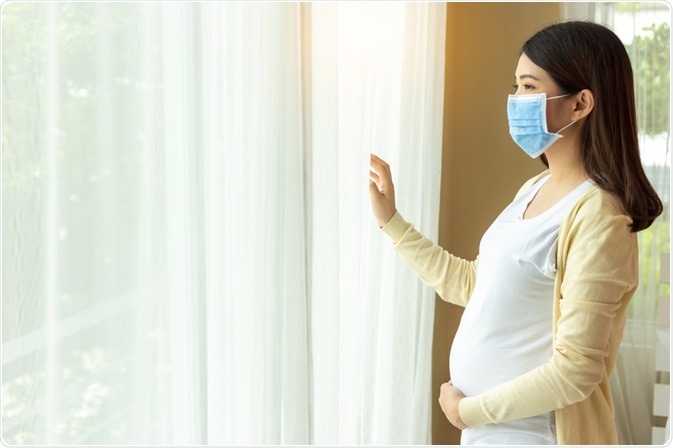https://healthmedicinentral.com/top/where-to-buy-generic-pro-erex-ca-without-prescription/
COVID-19 is a respiratory disease that in most cases is mild/moderate in severity. Pregnant women who get COVID-19 are typically at no further increased risk compared to non-pregnant women; however, in some cases, certain factors do increase the risk of hospital admission.
Irrespective, there is little evidence of danger to the developing child, though the likelihood of preterm birth can be higher. Overall, pregnancy is safe even with more moderate/severe COVID-19 with very little danger to the baby.
 Image Credit: Nutlegal Photographer / Shutterstock.com
Image Credit: Nutlegal Photographer / Shutterstock.com
Does pregnancy lead to more severe COVID-19?
A majority of studies thus far have not shown a significantly increased risk of developing more severe disease if pregnant. However, by default pregnant women are considered a moderate risk overall. Most pregnant women who get COVID-19 tend to only have mild or moderate symptoms, though there are always exceptions. Where there have been issues, they have been largely in the third trimester of pregnancy (28 weeks+).
Pregnant women should continue to follow the guidelines around social distancing, mask-wearing and frequent hand hygiene. Pregnant women in their third trimester should stay more vigilant and try to avoid as much social contact as possible with people not in their household or bubble.
Focusing on trying to achieve a safe and healthy pregnancy should be the priority. This can include (but is not limited to) folic acid and vitamin D supplementation, in addition to regular exercise.
Increased risk of more severe disease in some pregnant women
Whilst the majority of COVID-19 cases in pregnant women tend to be mild or moderate, there are some cases where there is a severe disease that may require intensive care unit admission in hospital.
The majority of the most severe cases tend to also be related to the common risk factors for developing more severe disease, including high body mass index, higher age of pregnancy and pre-existing comorbidities such as cardiovascular/lung diseases, chronic hypertension and diabetes (all forms including gestational).
COVID-19 and newborn babies
There is no evidence to suggest that newborn babies are at a significantly increased risk during pregnancy due to COVID-19. Recent studies have shown almost no increased prevalence of stillbirth or neonatal death in pregnancy with COVID-19, even with severe disease.
Mothers who are admitted to intensive care units due to severe disease tend to have a higher incidence of preterm births than those with milder COVID-19 or without. This may be related to COVID-19 directly causing complications, or on the advice of clinicians to ensure a safe birth.
There is very limited evidence of vertical transmission of COVID-19 from mother to baby. What is known, is that COVID-19 in newborns is uncommon, but there have been cases of newborns testing positive within 24 hours of birth. In these cases, it is unknown whether the virus was contracted before, during or post-birth. Of the newborns that have tested positive for COVID-19, the majority had mild or no symptoms with very few suffering severe illness.
The World Health Organization recently published a scientific brief (8 February 2021) on vertical mother-to-child SARS-CoV-2 transmission and its timing, reviewing current evidence on the subject.
Respiratory viruses are not easily transmitted in utero, and there have been no reports of the respiratory coronaviruses SARS-CoV or MERS-CoV being transmitted in utero. There are some cases of influenza transmission in this way. The WHO state that evidence of SARS-Cov-2 vertical transmission is incomplete and that data on the subject is limited due to factors like a lack of standardized definitions. Further research and standardization are needed to improve knowledge on this subject.
.jpg) Image Credit: Andrii Vodolazhskyi / Shutterstock.com
Image Credit: Andrii Vodolazhskyi / Shutterstock.com
Vaccines, pregnancy and breastfeeding
There is still very limited data on the effect of COVID-19 vaccinations during pregnancy and until there is concrete evidence that there is no ill-effect to both the mother and child, COVID-19 vaccines should not be routinely given to pregnant women, unless they are at increased risk of severe COVID-19.
It is highly recommended by the CDC that pregnant women get a flu jab in addition to whooping cough (Tdap) vaccine to protect both mother and child, as these both have clear evidence of no risk during pregnancy.
It is important to state that worldwide health authorities have not raised any specific concerns regarding COVID-19 vaccinations during pregnancy, however, until there is clear clinical evidence, these vaccinations are not advised during pregnancy unless advised otherwise by your doctor.
In line with guidance from health authorities across the world, receiving a vaccine whilst breastfeeding is not thought to be of a risk to the baby. Furthermore, testing positive for COVID-19 whilst breastfeeding is not thought to pose a risk of passing COVID-19 to the child. Currently (February 2021), the WHO recommends that women with COVID-19 can still breastfeed their newborns.
If the mother tests positive for COVID-19 after the birth of the child, it is important to employ preventative methods such as keeping a distance (as much as possible), wearing a mask and washing items frequently used by the baby. If a healthy caregiver not at risk of severe illness is available to provide care to the newborn once at home, this is an option, although precautions must be taken. Healthcare providers can help provide advice on this, or you can visit the CDC website for more guidelines.
Reassuringly, the risk of severe COVID-19 is very low in babies, and most babies will only have mild or no symptoms upon contracting it.
Summary
In summary, being pregnant and getting COVID-19 at the same time does not typically increase the risk of more severe disease in younger healthy women (especially in the first 2 trimesters). Furthermore, there is very little risk to both the mother and the developing child in most cases.
However, certain women with pre-existing comorbidities or of more advanced age or body mass index may suffer from an increased risk of hospitalization where the likelihood for preterm birth is higher. Ensuring a safe pregnancy is crucial, especially in the 3rd trimester, where pregnant women should stay more vigilant than most to minimize the risk of getting COVID-19.
References
- Allotey et al, 2020. Clinical manifestations, risk factors, and maternal and perinatal outcomes of coronavirus disease 2019 in pregnancy: living systematic review and meta-analysis. BMJ. 370:m3320. https://pubmed.ncbi.nlm.nih.gov/32873575/
- CDC.gov (2020). Pregnancy, Breastfeeding, and Caring for Newborns. https://www.cdc.gov/coronavirus/2019-ncov/need-extra-precautions/pregnancy-breastfeeding.html
- NHS.uk (2020). Pregnancy and coronavirus. https://www.nhs.uk/conditions/coronavirus-covid-19/people-at-higher-risk/pregnancy-and-coronavirus/
- World Health Organization (2021). Definition and categorization of the timing of mother-to-child transmission of SARS-CoV-2. https://www.who.int/publications/i/item/WHO-2019-nCoV-mother-to-child-transmission-2021.1
Further Reading
- All Coronavirus Disease COVID-19 Content
- Plasma Donation and COVID-19
- COVID-19 and Diabetes
- COVID-19 and Headache
- COVID-19 and Diarrhea
Last Updated: Feb 26, 2021

Written by
Dr. Osman Shabir
Osman is a Postdoctoral Research Associate at the University of Sheffield studying the impact of cardiovascular disease (atherosclerosis) on neurovascular function in vascular dementia and Alzheimer's disease using pre-clinical models and neuroimaging techniques. He is based in the Department of Infection, Immunity & Cardiovascular Disease in the Faculty of Medicine at Sheffield.
Source: Read Full Article
